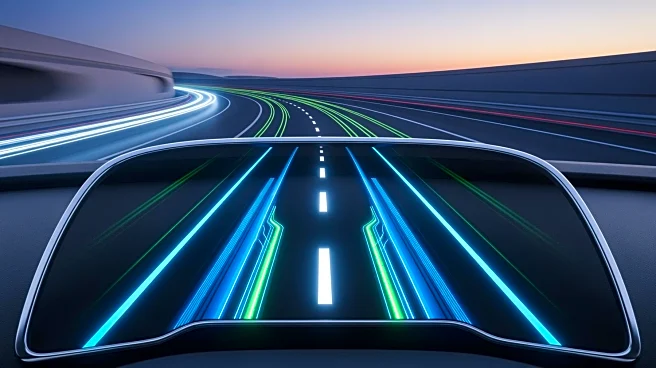What's Happening?
Polestar has announced a new software update for its Polestar 4 electric vehicle, integrating Google Maps' live lane guidance into the car's 10.2-inch driver head-up display. This feature utilizes Google's
on-device artificial intelligence to interpret lane markings, road signs, and other visual cues through a forward-facing camera. By combining this data with Google Maps navigation, the system provides visual reminders and audio alerts to assist drivers in changing lanes for upcoming exits. This innovation aims to reduce last-minute lane changes and improve navigation accuracy, especially in unfamiliar areas.
Why It's Important?
The introduction of AI-powered lane guidance in the Polestar 4 represents a significant advancement in automotive technology, enhancing driver safety and navigation efficiency. By providing real-time lane information directly in the driver's line of sight, the system minimizes distractions and potential errors, which are common in unfamiliar driving environments. This development underscores the growing trend of integrating artificial intelligence into vehicles to improve user experience and safety. It also highlights Polestar's commitment to continuous improvement through over-the-air updates, setting a precedent for other automotive manufacturers.
What's Next?
The new lane guidance feature will be rolled out to Polestar 4 owners in the United States and Sweden through an over-the-air software update in the coming months. As the technology is refined, it is expected to expand to additional markets and road types, potentially influencing broader adoption of AI-driven navigation systems in the automotive industry. Stakeholders, including other car manufacturers and tech companies, may respond by developing similar technologies to remain competitive in the evolving market.
Beyond the Headlines
This collaboration between Polestar and Google marks a milestone in the integration of AI with automotive systems, potentially paving the way for more sophisticated in-car technologies. The ethical implications of AI in driving, such as data privacy and reliance on automated systems, may become more prominent as these technologies become widespread. Additionally, the cultural shift towards smarter, safer vehicles could influence consumer expectations and regulatory standards in the automotive industry.









